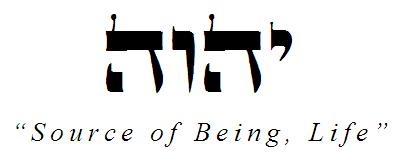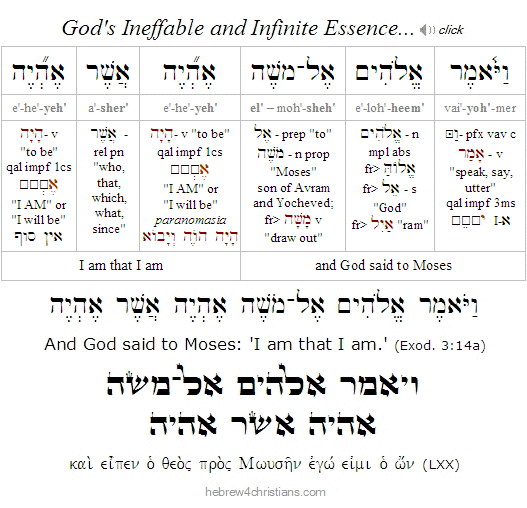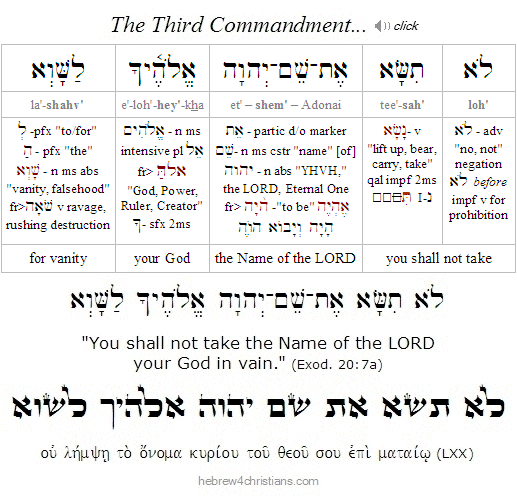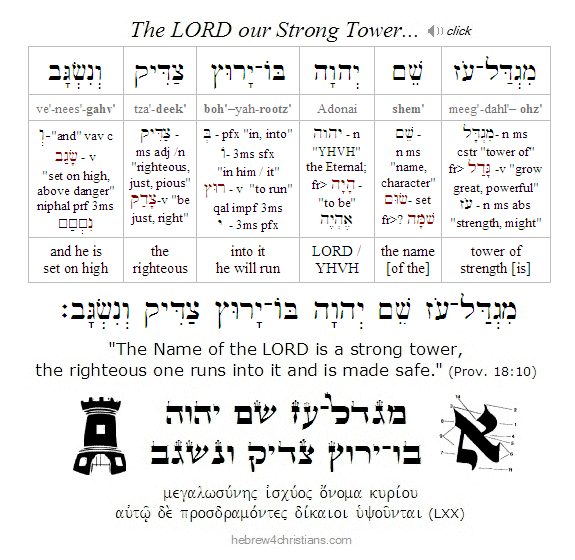|
|
|||||||||||||||||||||
 |
|||||||||||||||||||||
|
Learn Hebrew |
|||||||||||||||||||||
|
|
||||||||||||||||||||||||||||||||||||||||||||||||||||||||||||
|
Introduction |
|
In the Tanakh, YHVH (ūÖūöūĢūö) is the personal name of God and his most frequent designation, occurring over 6,800 times. This is the Mysterious or "Unutterable Name" of the God of Israel. Because it is composed from the four Hebrew letters Yod, Hey, Vav, and Hey, it is also referred to as the "Tetragrammaton," which simply means "the four letters." |
|
The phrase ehyeh asher ehyeh (rendered as "I AM THAT I AM" in the KJV) derives from the Qal imperfect first person form of the verb hayah (ūöūÖūö): "I will be" (ūÉūöūÖūö), and therefore indicates a connection between the Name YHVH and being itself. YHVH is the Source of all being and has being inherent in Himself (i.e., He is necessary Being). Everything else is contingent being that derives existence from Him. The name YHVH also bespeaks the utter transcendence of God. In Himself, God is beyond all "predications" or attributes of language: He is the Source and Foundation of all possibility of utterance and thus is beyond all definite descriptions. "The Holy One, Blessed be He, said to those, You want to know my name? I am called according to my actions. When I judge the creatures I am Elohim, and when I have mercy with My world, I am named YHWH" (Exodus Rabbah 3:6). Elohim (ūÉū£ūöūÖūØ) is the Name given for God as the Creator of the universe (Gen 1:1) and implies strength, power, and justice. YHVH, on the other hand, expresses the idea of God's closeness to humans. For example, YHVH is first mentioned as the One who "breathed into his (Adam's) nostrils the breath of life" (Genesis 2:7). |
||||||||||||||||||||||||
|
The Phonetics of the Name |
||||||||||||||||||||||||
|
The Third Commandment (Exodus 20:7) states, "Thou shalt not take the name of the LORD thy God in vain; for the LORD will not hold him guiltless that taketh his name in vain." In Hebrew: |
||||||||||||||||||||||||
|
Jehovah?
|
||||||||||||||||||||||||
|
The Morphology of the Name |
||||||||||||||||||||||||
|
The earliest forms of the sacred Name appear in proto-Hebrew script (a script that is closely related to ancient Phoenician script). In the Dead Sea Scrolls (DSS), instances of this morphology can be seen in the same running text as the classical Hebrew script (called ketav Ashurit: ūøū¬ūæ ūÉū®ūĢū©ūÖū¬, or "Assyrian writing style"): |
||||||||||||||||||||||||
|
YHVH and YHVH Compounds |
||||||||||||||||||||||||
|
Though we do not know how to pronounce the sacred Name, we can be confident that the letters ūÖųŠūöųŠūĢųŠūö derive from the Hebrew verb "to be" (i.e., hayah: ūöųĖūÖųĖūö) and indicate God's utter transcendence as the Source and Ground of all being.
YHVH / YHWH Yahoveh. yah-ho-VEH. YHVH / YHWH. [The basic form. Qere: a-doh-nai] The personal Name of Adonai, the transcendent Source and Ground of all being whatsoever. This Name appears 6,800+ times in the Tanakh (rendered in the KJV as the LORD [all caps]). The Jewish sages note that the four letters of the Name are used to form the phrase ūöūÖūö ūöūĢūö ūÖūöūÖūö, hayah hoveh yi'yeh, "He was, He is, He will be." The Name of God, YHVH (ūÖūöūĢūö), means "Presence" (Exod. 3:13-14), "Breath" (Gen. 2:7; Num. 16:22), "Life" (Deut. 30:20), and "Love" (Exod. 34:6-7), but it also means "I-AM-WITH-YOU-ALWAYS" (ūÉūĀūÖ ū¬ū×ūÖūō ūÉūÖū¬ūÜ), teaching us that God is an ever-present help for us (Psalm 46:1). The Name YHVH means that "God was (i.e., hayah: ūöūÖūö), God is (i.e., hoveh: ūöūĢųČūö), and God always will be (i.e., veyihyeh: ūĢų░ūÖų┤ūöų░ūÖųČūö)," which implies that He is ever present and not restricted by time or space. Moreover, God is called havayah (ūöų▓ūĢųĖūÖųĖūö), which means He is continually sustaining creation by the Word of His power: "In Him we live, move, and have our being" (Acts 17:28; Heb. 1:3). As it is poetically expressed in the Psalms, "Behind and before you cover me; You lay your hand upon me" (Psalm 139:5). Note that in those contexts where the actual title "Lord" (Adonai) also occurs, the convention is to translate YHVH as Elohim, that is "GOD," written in all caps: KJV Note: YHVH is transliterated as "Jehovah" in four passages where the name is particularly stressed (Exod. 6:3; Psalm 83:18; Isa. 12:2; Isa. 26:4] and in three passages to form constructs (e.g., Jehovahjireh (Gen. 22:14; cc Exod. 17:15; Jud 6:24)). Siddur Note: Often in the Siddur (and other Jewish religious literature apart from the Scriptures) the Sacred Name is not written as Y-H-V-H, but rather in an abbreviated manner: This is a convention in many Hebrew prayerbooks and dikdukim (grammars) to avoid casually writing or reading the Sacred Name. Note: The sacred Name for God was uttered aloud only 10 times once per year (during Yom Kippur) by the Kohen Gadol. When the people heard the Name, they prostrated themselves in deep reverence (Yoma 39b). HaShem Hashem. The Name (Lev. 24:11,16; Deut. 28:58). This term is often used to refer to the Sacred Name when studying the Scriptures and considering the Sacred Name of YHVH. This is often abbreviated simply as I AM THAT I AM Ehyeh asher Ehyeh (eh-YEH a-sher eh-YEH) I AM THAT I AM. (Exodus 3:14; cp. John 8:58).
The LORD God Yahoveh Elohim. The LORD God (Gen. 2:4). This Name shows that the Source and Ground of all being is also the personal God and Creator of the entire universe. References: Gen. 2:4f, 7ff, 15f, 18f, 21f; 3:1, 8f, 13f, 21ff; Exod. 9:30; 2 Sam. 7:25; 2 Kgs 19:19; 1 Chr. 17:16f; 28:20; 2 Chr. 1:9; 6:41f; Psa. 72:18; 84:11; Jonah 4:6. The LORD my God Yahoveh Elohai. The LORD my God (Psalm 13:3). The LORD our Father Yahoveh Avinu. The LORD our Father (Isa. 64:8). The LORD Most High God Yahoveh El Elyon. The LORD Most High God (Gen. 14:22; Psalm 7:17; Psalm 47:2). The LORD God of Israel Yahoveh Elohei Yisrael. The LORD God of Israel. Identifies YHVH as the God of Israel in contrast to the false gods of the nations (Isa. 17:6). The LORD who sees Yahoveh Yir'eh. The LORD who sees; Gen. 22:14; Adonai sees all and knows our needs intimately (rendered in the KJV as Jehovahjireh). Sometimes transliterated as "Jehovah Jirah" or "Jehovah Jireh." The LORD your Sanctifier Yahoveh Mekaddishkhem. "The Lord your Sanctifier." Portrays the Lord as our means of sanctification or as the one who sets believers apart for His purposes (Ex. 31:13). The LORD my Miracle Yahoveh Nissi. The LORD my Miracle, or The LORD my Banner; (Ex. 17:15) (rendered in the KJV as the Jehovahnissi). The LORD our Maker Yahoveh Osenu. The LORD our Maker (Ps. 95:6). The LORD our Righteousness Yahoveh Tzidkenu (or Tsidkeinu). The LORD our Righteousness (Jer. 23:6, 33:16). The LORD of hosts Yahoveh Tzeva'ot. The LORD of armies (or hosts). Tsava means army. References: Exo 12:41; 1 Sam. 1:11; 4:4; 15:2; 17:45; 2 Sam. 6:2, 18; 7:8, 26f; 1 Ki. 18:15; 2 Ki. 3:14; 1 Chr. 17:7, 24; Ps. 24:10; 46:8, 12; 48:9; 59:6; 69:7; 80:5, 20; 84:2, 4, 9, 13; 89:9; Isa. 1:9, 24; 3:1, 15; 5:7, etc.; Amos 4:13; 5:14ff, 27; 6:8; Mic. 4:4; Nah. 2:14; 3:5; Hab. 2:13; Zeph. 2:9f; Hag. 1:2, 5, 7, 9, 14; 2:4, 6ff, 11, 23; Zech. 1:3f, 6, 12, 14, etc.; Mal. 1:4, 6, 8ff, 13f; 2:2, 4, 7f, 12, 16; 3:1, 5, 7, 10ff, 14, 17, 19, 21. The LORD my Shepherd Yahoveh Ro'i. (ro-ee) The LORD my Shepherd (Ps. 23:1, Ez. 34:2). The LORD who heals you Yahoveh Roph'ekha. The LORD who heals you; The LORD your healer; (Ex. 15:26). Sometimes mistakenly named the LORD our Healer. The LORD of peace Yahoveh Shalom. The LORD of Peace (Judges 6:24) (rendered in the KJV as Jehovahshalom). The LORD your God Yahoveh Eloheikhem. "The LORD your [pl.] God" (Lev. 19:3). The LORD my Rock and Redeemer Yahoveh Tzuri v'goali. "The LORD my Rock and my Redeemer" (Psalm 19:14[5h]). The LORD God of David Yahoveh Elohei David. "The LORD God of David" (Isaiah 38:5). The LORD my Rock Yahoveh Sal'i. The LORD my Rock (or Hiding Place, as in the crag of a cliff) (Psalm 18:2). The Angel of the LORD Malakh Adonai This mysterious Angel was treated as YHVH Himself, exercising divine prerogatives and receiving worship (see Genesis 16:7, 9, 11; Exodus 3:2-6; Judges 13:21-22). References: Genesis 16:7, 9ff; 22:11, 15; Numbers 22:22ff, 31f, 34f; Judges 2:1, 4; 5:23; 6:11f, 21f; 13:3, 13, 15ff, 20f; 1 Kings 19:7; 2 Kings 1:15; 19:35; 1 Chronicles 21:16, 30; Psalm 34:8; Isaiah 37:36; Haggai 1:13; Zechariah 1:11f; 3:1, 6; Malachi 2:7. Note: The Aramaic Targum of Onkelos (Genesis 16:13) identifies the Angel of the Lord with the Shekhinah, the concrete manifestation of the presence of God. The LORD my Light Yahoveh Ohri The LORD my Light (Psalm 27:1) The LORD my Salvation Yahoveh yishi The LORD my Light and my salvation (Psalm 27:1) Shem Hameforash  The sacred Name for God was spoken only 10 times once per year (during Yom Kippur) by the Kohen Gadol. When the people heard the Name, they prostrated themselves in deep reverence (Yoma 39b).
Theophoric Names A "theophoric" name is one that "bears" or embeds God's Name into a person's name. They are very common in the Scriptures, and here I will list a few that are well known.
|
||||||||||||||||||||||||
|
Hebrew for Christians |
||||||||||||||||||||||||
|
||||||||||||||||||||||||




